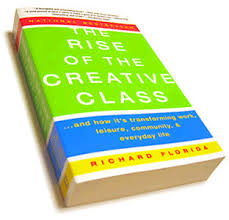When I first heard the phrase “creative class” I instantly got excited. Much like the phrase “group think” or “food coma”, a name had finally been created for something that’s been around for hundreds of years without a proper label.
 I thought, finally there’s some acknowledgement of people from whom original thought constantly emanates, an umbrella for people with whom music/film/books resonate so deeply they miss meals and show up late for everything.
I thought, finally there’s some acknowledgement of people from whom original thought constantly emanates, an umbrella for people with whom music/film/books resonate so deeply they miss meals and show up late for everything.
In this blog series we’ll explore the idea of a creative class and understand where global citizens who possess these traits have been – as a stratum of society- and where they may be headed.
Online research quickly taught me that the creative class has already lived through a dot.com bubble of sorts, thanks to the hopeful and entrepreneurial vision of Richard Florida, an economist at the Martin Prosperity Institute in Toronto.
In 2002, Florida published a book called the “The Rise of the Creative Class” which espoused the idea that whenever leaders of a floundering metropolitan city wish to revive their economy, they should simply create conditions that attract artistic folks. This makes sense to me. I don’t need charts and graphs to understand how magical the streets of Paris must have felt in the early 20th century. And I recently watched a roomful of auto industry titans agree with instant consensus that Austin, TX would be ideal for their next gathering.
But Florida’s template for success didn’t meet the expectations held by everyone who paid his high consulting fees. While the re-building efforts legitimately could be credited for boosting real estate values in Portland’s Pearl District and Chicago’s Wicker Park, the gestalt of these civic efforts in many cases often “ended up looking something like the metropolitan equivalent to a midlife crisis.”
The economic gains from planting cafes, street musicians and home brewing shops in the middle of cities like Cleveland and Memphis in order to attract “young, largely single, childless and sometimes gay people into urban neighborhoods” paled in the comparison to cities like Pittsburgh and Houston who enjoyed a resurgence due to the natural gas boom.
There are more people who need to pump gas than hear a poetry-reading. I get it. But the world didn’t stop needing web programmers just because Pets.com tanked in 2000. And the internet has continued to advance very nicely long after Wall Street shifted its investment money over to condominiums in Miami.
So in these blogs I’ll explore other prisms through which this “creative class” people – my group of people – have been (and could be) viewed, exploited, utilized and enriched. Stay tuned.
Sources:
http://stateimpact.npr.org/pennsylvania/drilling/
http://www.thedailybeast.com/articles/2013/03/20/richard-florida-concedes-the-limits-of-the-creative-class.html
http://www.newrepublic.com/article/115982/richard-florida-creative-class-prophet-now-talks-rust-belt
http://en.wikipedia.org/wiki/Creative_class
http://en.wikipedia.org/wiki/Pets.com
______________________________________________________________________________
Mike Bielenberg is a professional musician and co-founder of http://www.musicrevolution.com, a production music marketplace with over 35,000 tracks online where media producers, video producers, filmmakers, game developers, businesses and other music buyers can license
high-quality, affordable royalty-free music from an online community of musicians mbielenberg@musicrevolution.com. ![]()